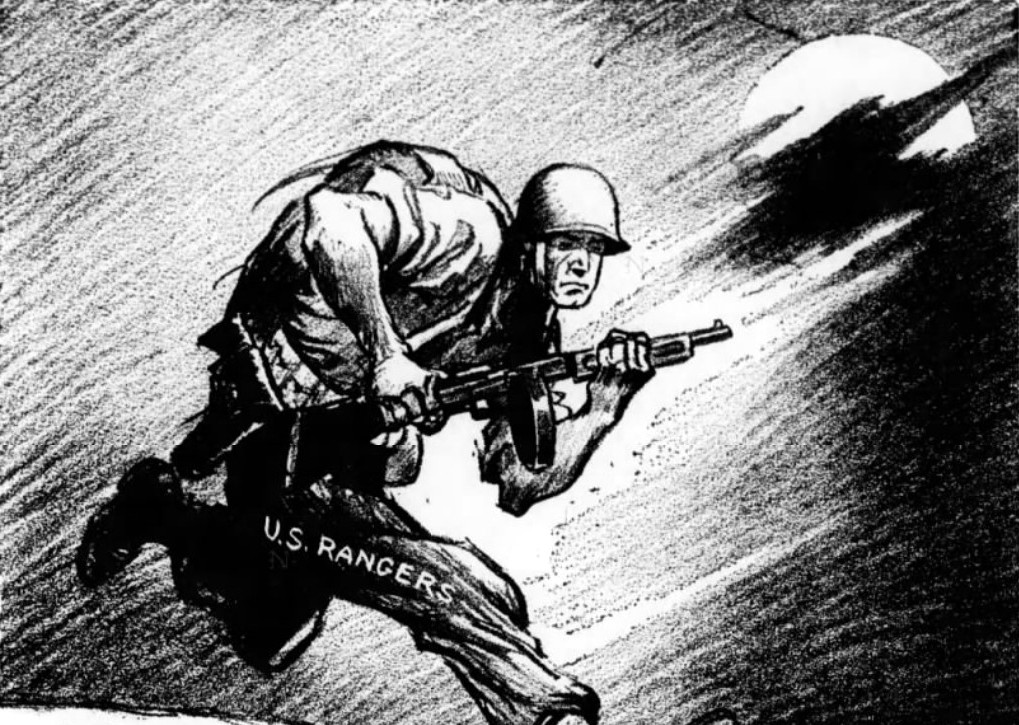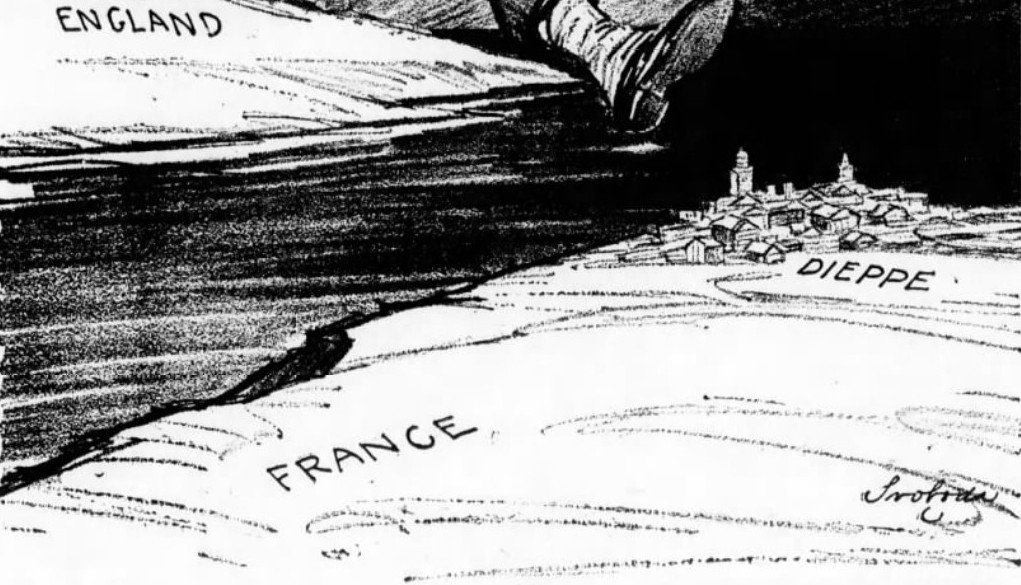vb. Wien, 20. August –
Die ganze Welt steht unter dem Eindruck der vernichtenden Abfuhr, die der von Churchill auf Stalins Befehl unternommene Invasionsversuch bei Dieppe gefunden hat. In neun Stunden war der ganze Spuk vorbei. Unter höchsten Verlusten und wie schon so oft unter Zurücklassung der schweren Waffen wurden die gelandeten Kommandotruppen ins Meer geworfen und die abziehende Flotte durch die Luftwaffe rastlos bis in ihre Heimathäfen verfolgt. Der zerzauste britische Löwe leckt seine Striemen. Man sucht in London und Washington die armseligsten Trostgründe zusammen, um auch noch diese Katastrophe den eigenen Völkern mundgerecht zu machen. „Wir und die Briten dringen in Frankreich ein“, so schrieb auf die ersten Berichte von der Landung hin das Neuyorker American Journal. Jetzt aber war plötzlich die Niederlage „geplant“ und wird nur als „Generalprobe im Kostüm“ dargeboten.
Um 16 Uhr stand kein bewaffneter Feind mehr auf dem Boden des Festlandes, aber noch Stunden später ging der Londoner Nachrichtendienst mit der alten Ausrede hausieren‚ die deutschen Angaben seien „noch nicht bestätigt“. Immerhin wird auf schwere Verluste vorbereitet und vorsorglich bemerkt‚ dafür habe man „wertvolle Erfahrungen“ gemacht. Kurz zuvor aber hatte Reuter noch triumphierend mitgeteilt:
Das Landungskorps der Verbündeten hat an allen Stellen‚ wie vorgesehen, festen Fuß gefaßt, die heftigen Kämpfe nehmen ihren Fortgang.
Der Einsatz der britischen Luftstreitkräfte verstärke sich dauernd.
Der Sender Neuyork sprach um 14 Uhr von „einer großen Operation“, United Press von einem „Angriff großen Ausmaßes“, und überhaupt war man in den USA. ganz aus dem Häuschen.
Willkie ist entzückt
„Das ist großartig, das sind vorzügliche Nachrichten!" so krähte Roosevelts Busenfreund Wendell Willkie.
„Ungeheures Interesse und großer Jubel“ herrschten nach Neuyorker Berichten überall. Der Vorsitzende des USA.-Senatsausschusses für militärische Angelegenheiten, Reynolds, beteuerte, daß der gemeinsame amerikanisch-kanadisch-britische Angriff sich zur zweiten Front entwickeln und ausdehnen werde. Die gelandeten Streitkräfte seien stark genug dazu, und das Kampfgelände sei zu Landungsoperationen äußerst günstig. Senator Pepper meinte, daß die „Verbündeten Nationen“ die zweite Front nicht nur in Frankreich eröffnen würden, sondern auch die Sowjets mit Verstärkungen unterstützen wollten. „Die Nachrichten von den Offensiven der Alliierten sowohl in Europa wie im Pazifik“, so frohlockte der USA.-Senator am Mittwoch früh, „sind großartig und ermutigend“.
Sie alle waren also überzeugt‚ daß ganz große Erfolge zu erwarten wären‚ daß die gelandete Division einen Brückenkopf bilden und daß dann die noch weit stärkere zweite Welle zur Aktion schreiten werde. Natürlich wurde auch Moskau in diesem Sinne unterrichtet und sofort gab man dort eine hoffnungsfreudige Meldung aus.
Alberne Ausreden
Nach dem Debakel liest man das alles aber ganz anders. Jetzt ist die Eröffnung der zweiten Front zur Generalprobe zusammengeschrumpft, ja zu einem „Handstreich“, der so verlaufen sein soll, „wie es geplant war“ und dazu bestimmt gewesen sei, „ein vorbereitendes Invasionsstadium einzuleiten". Dann kommt in der Verlautbarung des „Hauptquartiers der kombinierten Operationen“ die faule Redensart von den wertvollen Erfahrungen, die man einzig und allein mit diesem starken Einsatz beabsichtigt haben will. Als ob man nicht schon in Flandern und in Nordafrika genügend Erfahrungen mit der deutschen Schlagkraft gemacht hätte!
Noch lächerlicher als dieses verlegene Gestammel sind die albernen Ausreden, die der Sprecher des USA.-Kriegsdepartements am Mittwochabend vortrug. Er sagte, es sei möglich, daß der Angriff auf Dieppe mit dem zweifachen Ziel unternommen wurde‚ die Deutschen nervös zu machen und den britischen und amerikanischen Truppen Gelegenheit zu geben, im Landen von Tanks und Kanonen sich die nötige Übung zu erwerben, selbst wenn diese schweren Waffen auf französischem Boden zurückgelassen werden mußten. „Es scheint mir, als handle es sich hiebei um eine ganz besonders große Uberfallprobe“‚ gab der Sprecher dann noch abschließend von sich.
Kurzum, es ist wie in der Fabel vom Fuchs mit den sauren Trauben. Man hat einen großen Schlag führen wollen, der nach eigener Feststellung zehn Monate vorbereitet worden ist, und dementsprechend hat man sich schon beim ersten Schuß etliche Scheffel Vorschußlorbeeren zugeteilt. Nachdem man aber Prügel bezogen hat und nach allem vorangegangenen Getöse schließlich nicht gut behaupten kann, die Affäre von Dieppe sei eine bösartige deutsche Erfindung, ist das alles nur ein der uns nervös machen sollte.
Nervös aber war nicht die deutsche Abwehr‚ die den Gegner so schneidend abfertigte‚ sondern Churchill, der auf Stalins Befehl diese Operation ins Werk setzte um wenigstens an einer Stelle eine zweite Front zu bilden und daraus nicht zuletzt agitatorische Vorteile zu ziehen. Die Times verriet uns, die Sowjets hätten in Moskau den Engländern und Amerikanern mit Erfolg eingeredet‚ daß Deutschland Westeuropa nicht verteidigen könne. Nun konnte Churchill allerdings eine Erfahrung teuer erkaufen: daß die deutsche Verteidigung sehr stark und jeder Aufgabe gewachsen ist.
Das erste große Gastspiel der „Kommandos“ des Lord Louis Moutbatten, dem man mit der üblichen Bescheidenheit schon „Nelson-Geist“ andichtete, endete mit einer Katastrophe‚ die kein Wortschwall aus der Welt schafft. Man fühlt in London auch sehr gut, in welche Widersprüche inan sich verwickelt hat. Als der Rundfunkkommentator Cyril Ray sich der dornenvollen Aufgabe unterzog, einen „planmäßigen Rückzug“ glaubhaft zu machen, behauptete er, es hätte gar keine lnvasion stattgefunden. „Eine Invasion kann doch nicht innerhalb von neun Stunden fehlschlagen“, so stotterte er.
Aber das ist es ja gerade! Sie schlug eben in neun Stunden fehl‚ und daher kann auch dieser bedauernswerte Seiltänzer keine Antwort auf die Frage geben, was sich denn nun eigentlich ereignet hat‚ wenn man keine Invasion oder die Bildung eines Brückenkopfes angestrebt haben will.
Dafür aber geben die Ereignisse selbst eine um so klarere Antwort, die jeder denkfähige Mensch auf der Welt und sogar in London, Neuvork und Moskau begreift – nicht zuletzt Churchills Auftraggeber Stalin, der bestimmt etwas ganz anderes erwartet hat.

